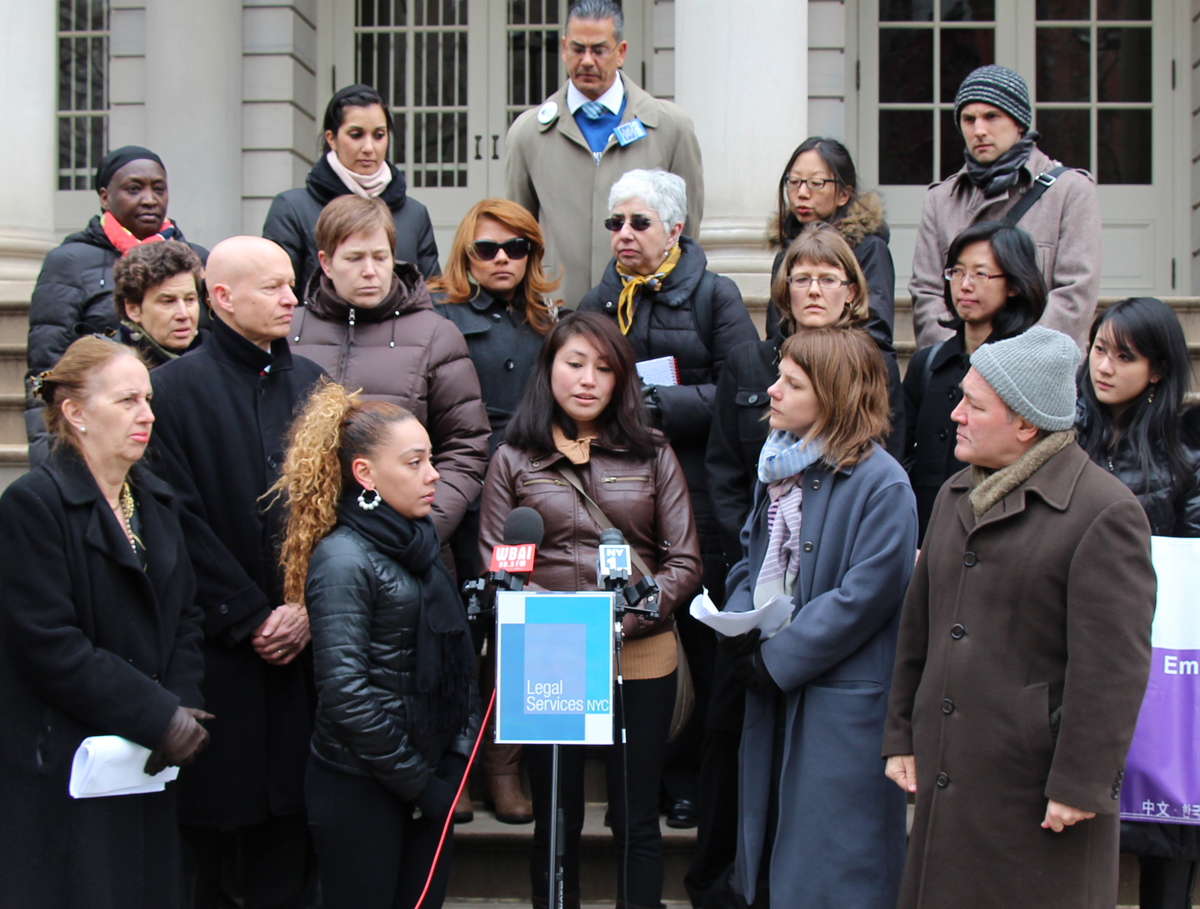Legal Services NYC and NYPD Announce New Language Access Policies

May 25, 2017, NEW YORK— Today, Legal Services NYC and the New York City Police Department announce new foreign language access policies to ensure that people will be able to communicate with NYPD officers, no matter what language they speak. (Photo: LSNYC Client Arlet Macareno speaks at a 2013 press conference announcing the lawsuit)
Press coverage: New York Times
In 2016, the NYPD provided all its officers with cell phones thereby enabling direct access to Language Line in the field, a telephonic service that provides interpretation in over 170 languages.
Over the next 18 months, officers will receive enhanced training on how to determine when someone needs language assistance, which one of an array of available tools is best suited to the situation, when to use a telephonic interpreter and how to access an interpreter 24/7.
Officers who speak one or more foreign languages are offered the opportunity to become certified bilingual officers, allowing them to provide police services expertly in that foreign language. Bilingual certification provides an objective barometer of individuals’ fluency levels and helps officers gauge when they need to seek assistance from a professional interpreter.
New protocols will be rolled out throughout NYC over the next year and a half, to address issues raised in a lawsuit filed by Legal Services NYC in 2013, Padilla v. City of New York. The NYPD’s new language access policies prescribe certain procedures when officers are responding to domestic violence incidents involving someone who does not speak English well, providing additional assurance that domestic violence survivors will be heard despite a language barrier. In addition, officers will be required to report the use of foreign language interpretation services during their investigation of/response to domestic incident calls, allowing NYPD to monitor the provision of foreign language interpretation services. The Padilla lawsuit has been resolved as a result of the new policies and protocols.
“It is vital in a City as diverse as New York, that everyone be able to communicate properly and precisely with the police,” said Christine Clarke, one of the lawyers on the case and the Director of the Civil Rights Justice Initiative at Legal Services NYC. “Miscommunications with the NYPD can result in serious consequences for people, including arrest and detention. We are therefore very encouraged to see that the NYPD is taking language access seriously and ensuring that all officers have the training and equipment they need to communicate accurately with all New Yorkers.”
“It makes a huge difference for people when police officers can understand them and communicate with them in a crisis situation,” said Cecilia Gastón, Executive Director of the Violence Intervention Program, an organization which was a plaintiff in the Padilla litigation and which provides services and support to Latina survivors of domestic violence. “It is very difficult, if not impossible, to speak a foreign language when you are in a stressful situation. These new protocols and trainings at the NYPD will lead to better outcomes for survivors and will help create safer communities.”
Susan Herman, NYPD Deputy Commissioner, Office of Collaborative Policing, said, “The NYPD is deeply committed to overcoming language barriers. Recent improvements to our language access policies have been made possible by technology. We have equipped every patrol officer with a cell phone capable of accessing an interpreter 24/7. This is a game changer for us. Bridging language barriers will make New York safer for all, promote equal access to vital police services and strengthen our relationship with immigrant communities.”
Previously: Legal Services NYC Files New Federal Lawsuit against NYPD
###
Join us. Demand Justice.
In this extraordinarily challenging moment, your partnership with LSNYC is critical. Please join us by making your gift today.